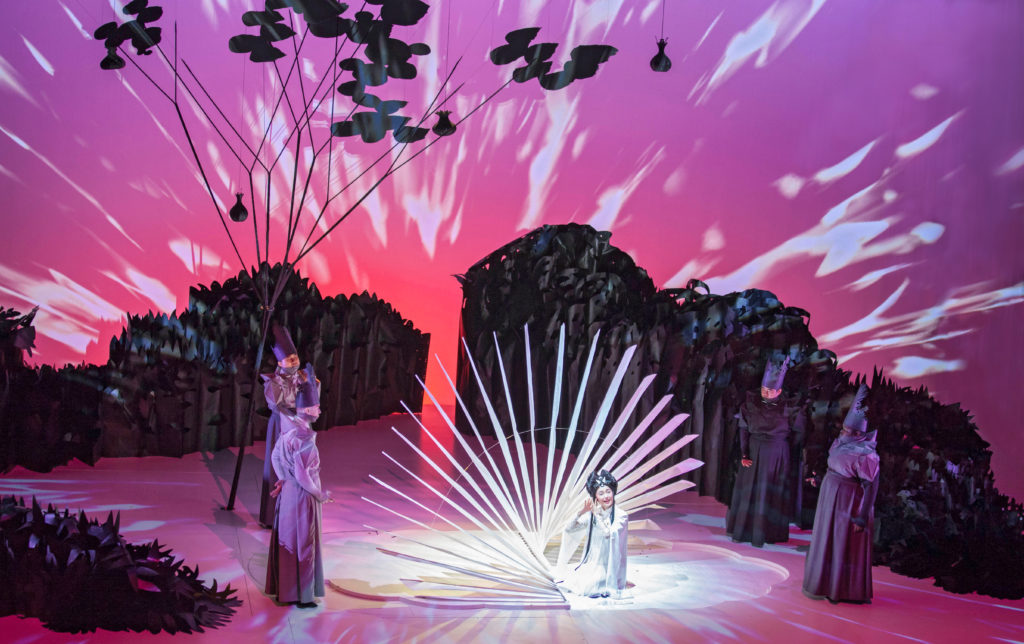
“Paradise Interrupted” installation opera, Scene IV. “Rebirth,” image by Julia Lynn Photography
In the words of composer Huang Ruo, “The installation opera Paradise Interrupted integrates opera, theater, dance, music, poetry, made-up words, interactive multimedia, and cross-cultural operatic spirits, all into one entity.”
Sound ambitious? It is. This stunning opera combines more media than I’ve ever seen in one work of contemporary art, while gracefully navigating Chinese-English translation. For this reason, I wanted to talk with the artist mastermind, Jennifer Wen Ma, Director and Visual Designer of Paradise Interrupted, which kicked off Lincoln Center Festival. (Tickets sold out immediately, but the festival runs through July 31st with other amazing productions worth checking out).
Paradise Interrupted tells the psychological story of a Woman’s journey through a surreal garden. Inspired by Eve’s expulsion from the Garden of Eden and The Peony Pavilion, one of China’s best-loved classical operas from the Ming dynasty, the main character, portrayed by Qian Yi, builds off significant historical background. Yi’s performance in Lincoln Center Festival’s famous 1999 production of The Peony Pavilion introduced New Yorkers to the 600-year-old Kun opera tradition, and subsequently provoked the Chinese government to ban her from performing in China. Jennifer Wen Ma reinvents these stories yet again with new collaborative experimentation. As the fable unfolds, interactive video responds to the character’s songs, and a paper sculpture garden comes to life.
Paradise Interrupted opens with the nameless main character “the Woman” alone onstage dreaming of an erotic encounter with her ideal lover. When her lover disappears upon waking, she is called to various stages of maturation by The Celestial Elements: first Wind, then Fireflies, Wolf spirits, and finally consummation with a white Flower. At the end of her poetic trip, the Woman ultimately breaks free from all her desires into a pool of Sumi ink, which enables her to freely paint any world she imagines.
Last week, I had the opportunity to chat with Ma and Guillermo Acevedo, the Interactive Video Designer, before they made tech adjustments for their second performance. They share about the audio-responsive video projection, the inspiration for the work, and the meaning of “Paradise.”
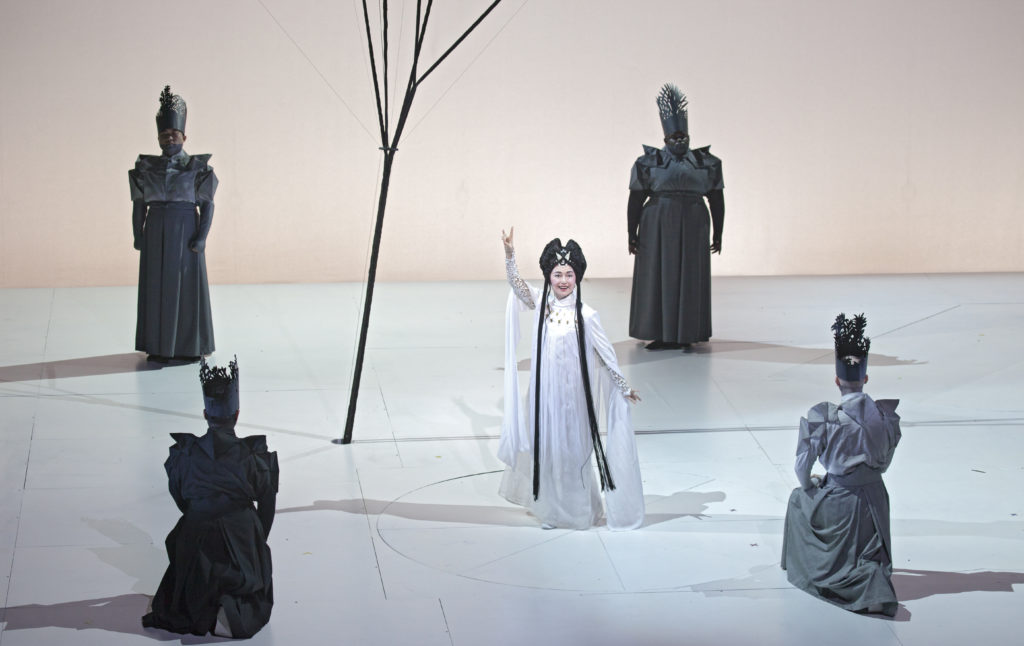
“Paradise Interrupted” installation opera, Scene II. “Garden,” image by Julia Lynn Photography
Let’s talk about your concept for this huge project! Jennifer, how did your previous projects lead you to Paradise Interrupted? What inspired this work?
A lot of these ideas started percolating in 2012, when I did a project called Hanging Garden in Ink at UCCA, the Ullens Center for Contemporary Art in Beijing. In the atrium, I created a 60 foot long and 30 foot tall tableau of inked plants that were suspended in mid-air. The plants were hung half right-side up and the other half upside-down, creating a mirror image that is floating in space, or as if an island in water. The inspiration springs from the hanging garden of Babylon.
Underneath [Hanging Garden in Ink] I staged a little bit of opera from The Peony Pavilion—the dream sequence where the main character, Du Liniang, dreams of her fantasy lover. I thought a dream garden could be black and white, and it could be upside down too, very surreal. So from there I had this idea of creating a paradise, a mystical garden. I wanted to explore questions like, “What does it mean to have utopia? To have paradise? To gain it, lose it?” This was the inkling of an idea that started the whole chain of events that lead to Paradise Interrupted.
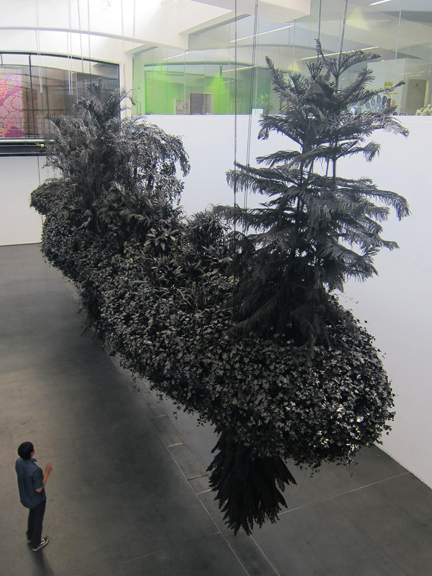
“Hanging Garden in Ink,” Ullens Center for Contemporary Art, Beijing, China, 2012
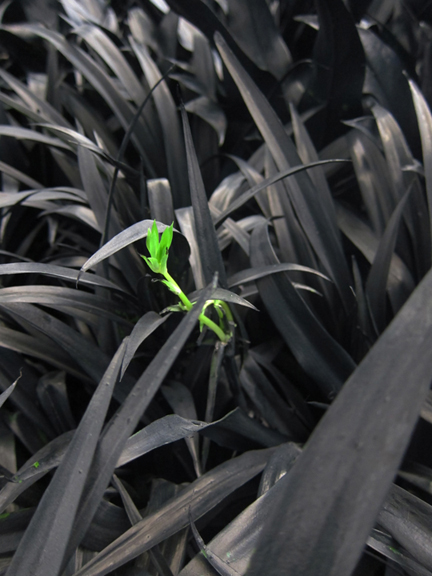
“Hanging Garden in Ink,” detail
The color of your black ink garden suggests that the pursuit of utopia can suffocate the life it is trying to cultivate. Yet these plants triumph with new green shoots outgrowing their sooty coating. What real world stories are telling with the black garden?
It is a cautionary tale of how civilizations rise and fall. At the time, there was so much talk about China being this impressive giant that’s leaping economically, how it was dominating world economics. But there are cycles, and the Babylonian culture is now just a legend. We don’t even know whether the hanging gardens actually existed or if it was just a myth.
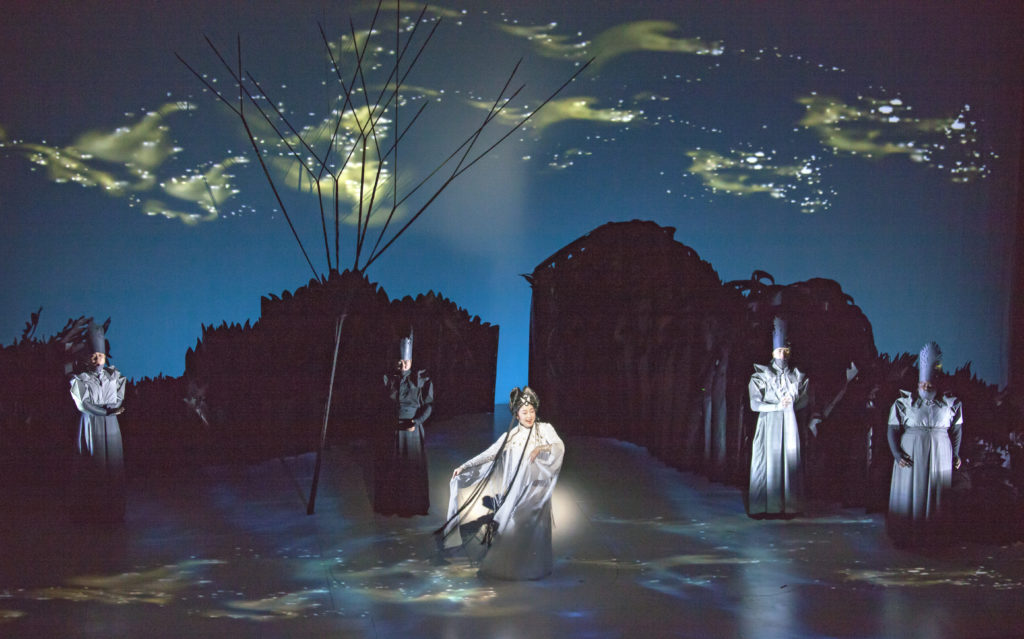
“Paradise Interrupted” installation opera, Scene III. “The Lover,” images by Julia Lynn Photography
The first thing that appears on stage is a horizontal white line that fluctuates with the Woman’s voice. It’s stark yet beautiful. Guillermo, why did you and Jennifer start the show this way?
The white line is the horizon in the landscape. One of the things we wanted to do, was to very quickly, very simply, tell people: yes, this is interactive, so that people would not be distracted with trying to figure out the technicalities and just enjoy the play.
The interaction is operated by her voice, which brings the light to life [the movement of fireflies, for example, is determined by her voice] and gauges the emotional content of her singing. The fireflies are what we call a particle system, which means that they behave independently. The sound modifies their behavior—it gives them more energy, or hunger, or fear. Invisible “enemies” make them move around so that sometimes they are very active and fast, and sometimes they’re slow and ponderous. They’re an additional actor, contributing to the story abstractly.
This is a very contemporary take on the opera. Jennifer, have you ever experienced opposition to any of your ideas?
When I asked the young performer that played Du Liniang [for The Peony Pavilion under Hanging Garden in Ink] to make the scene more contemporary by simplifying the gestures she said, “No. This is perfect, it cannot be messed with, not a single line, not a single movement.”
As an art worker and creator, when someone holds on so tightly to history, it motivates me to investigate that impulse further. I’m all for a museum piece in which you want to preserve the past, but for a practice to stay alive, you need to keep pushing boundaries and trying different things. For me, that meant breaking down an old opera for a contemporary setting.
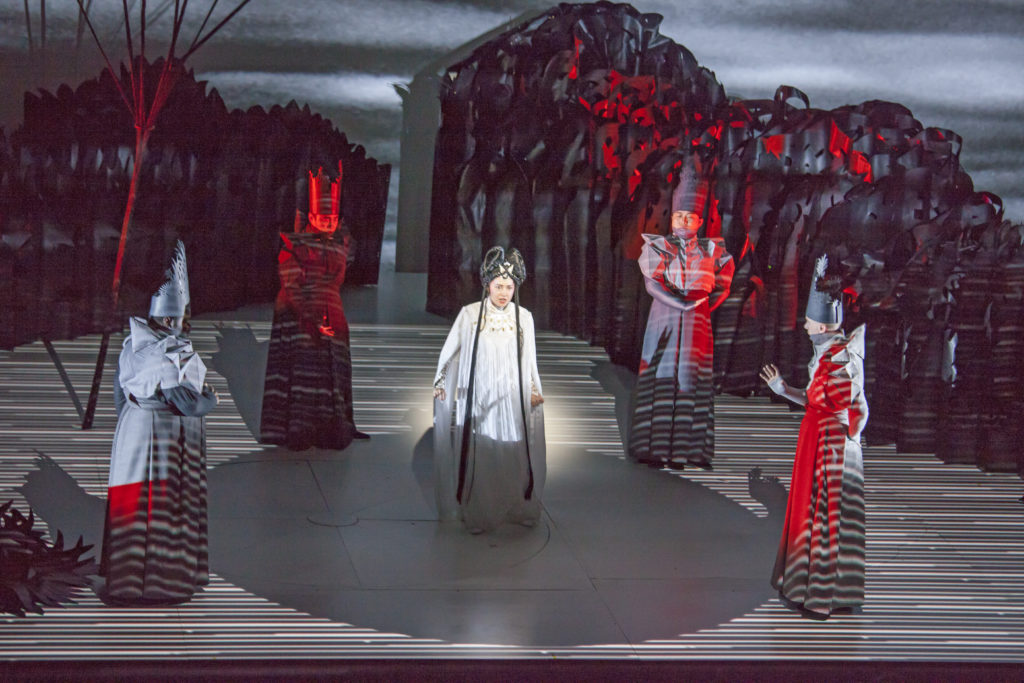
“Paradise Interrupted” installation opera, Scene III. “The Lover,” images by Julia Lynn Photography
One of the qualities I love about Paradise Interrupted is that the Woman is so much more complex than the female protagonists in either story. Can you talk about that?
Yes! Being the first woman in Eden must’ve been amazing! Just imagine the night after Eve has been kicked out… what a shock it must’ve been, right?! But what if there was an alternate journey? What if Du Liniang didn’t rely just on love? These famous stories in both the East and West often end with the woman finding love as if that’s it. But we all know that’s not it.
Life continues too! And you still have every kind of struggle that continues. In Paradise Interrupted, there are a different series of awakenings: sexual awakening, understanding of youth and time, love and the Woman’s animal instincts, even touching on parental love. All these things are a series of revelations that she went through in this process. So what you get is: the idea of a garden as a stand in for utopia, and the Woman’s search to gain her utopia and finding something else instead—her own self.
What experience do you want to communicate to your audience?
That finding our own paradise is a universal struggle.
As it happens, when I was doing research about paradise, I learned that the word “Paradise” actually comes from an old Iranian word that means “walled enclosure.” So that a wall, a border, has been with the idea of paradise from the beginning, to keep certain things in, to keep certain things out.
The Chinese character “garden” (traditional “園,” simplified “园” ) has a [calligraphic] boundary as well. Whether it’s Adam or Eve; or Chinese scholars being disillusioned with political life—that cradle of paradise is something you grow out of and rebel against.
Paradise Interrupted will travel to Singapore International Festival of Arts August 31 – September 3, 2016; and National Kaohsiung Center for the Arts in Taiwan, dates to be announced soon. To see more of Jennifer Wen Ma’s work: www.littlemeat.net


Comments on this entry are closed.